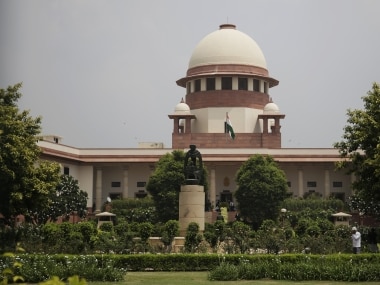The Supreme Court declined to hear an appeal filed against an earlier judgment of the Patna High Court, which had quashed a defamation complaint against a media channel which reported on allegedly irregular allotment of land in the Bihiya Industrial Area by the Bihar Industrial Area Development Authority. According to the appellant in the case (the original complainant before the Magistrate’s Court), the news channel had made factual inaccuracies in its reportage of the event and thereby tarnished her reputation. [caption id=“attachment_4297691” align=“alignleft” width=“380”]  Representational image. AP[/caption] However, the Patna High Court in its judgment had held that the complaint was untenable. It said the accused were charged with conspiracy, but necessary sanction under Section 196 of the Code of Criminal Procedure, 1973, had not been obtained prior to their prosecution, and therefore the magistrate could not take cognisance of the offence of defamation. However, the Supreme Court declined to hear the appeal and passed some oral observations that are worth noting. Chief Justice Misra observed: “In a democracy, you must learn to tolerate. The case has continued since 2011. The persons have spent a lot of time and money in defending themselves. Defamation may be constitutionally valid. But an alleged incorrect news item about a scam does not amount to defamation.” He further added, “There could be some error or enthusiasm in reporting an alleged scam. But we must allow freedom of speech and expression to press at the fullest. There may be some wrong reporting. For that they need not be hauled up for defamation.” Section 499 of the Penal Code of 1860 makes defamation a criminal offence punishable with two years’ imprisonment and fine. The Supreme Court has upheld the validity of this provision. Section 499 has many exceptions, but all the exceptions hinge on imputations or statements being truthful.
Given the fact that the press sometimes has to reproduce allegations or information as it’s being received, the press cannot at all times be able to verify and authenticate all the information it publishes. Some of the information will be unverified and subject to further confirmation. By linking truth as the standard, it opens the door to harassment of the media through defamation cases.
This is why in the UK, the House of Lords in Reynolds v Times Newspapers Ltd (2001) 2 AC 127 outlined what is known as the public interest defence. It is a qualified privilege that permits a journalist to publish an an allegation in the public interest even if the allegation later turns out to be false. This is colloquially known as the ‘Reynolds Defence’, and is an important development in defamation in common law. The UK codified this defence when it codified its civil law on defamation (defamation is not a crime in the UK) via its Defamation Act, 2013. India has codified its criminal law on defamation via Section 499 of the penal code and has provided a series of defences as exceptions in the section itself. But there is a need to introduce something like the ‘Reynolds Defence’ to Section 499 in order to protect the press from frivolous defamation complaints. Provisions like Section 499, in the absence of a clear public interest defence, may deter the press from reporting on scams and news that is unfavourable to public figures. For example, a politician or an industrialist may use the defamation law to threaten a newspaper and prevent publication of a scam or allegation of a scam. The public is better served by knowing about an allegation then by being left in the dark. Further, India also needs to codify its law in relation to civil defamation. The law as it stands now is judicial precedent. It is not codified and libel remains the last bits of common law that hasn’t been reenacted via statute. This creates significant room for ambiguity as to what constitutes qualified privilege, especially for journalists who require to examine the legal position prior to publishing their articles. India ought to follow the British example and codify the civil law on defamation and incorporate defences of qualified privilege. Further, there is also a need to impose a standard on corporations to prove financial loss before they can claim to be defamed. This will prevent industrialists from attacking the press in the name of libel in the future.


)

)
)
)
)
)
)
)
)



